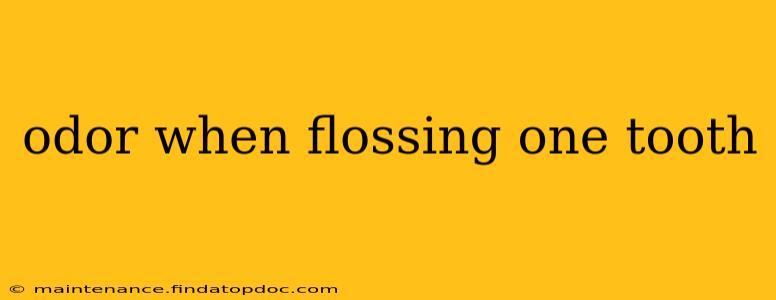Flossing is crucial for maintaining good oral hygiene, but sometimes flossing reveals a surprising, and unpleasant, smell emanating from just one tooth. This localized odor isn't just a minor inconvenience; it can signal an underlying dental problem that needs attention. This comprehensive guide will explore the potential causes of a foul odor from a single tooth when flossing and offer solutions to address the issue.
What Causes a Bad Smell When Flossing Only One Tooth?
A bad smell when flossing only one tooth typically points to a localized issue, unlike general bad breath which often originates from the tongue or elsewhere in the mouth. The most common culprits include:
-
Food Debris Trapped Between Teeth: While regular brushing removes surface debris, food particles can become lodged between teeth, especially around the gum line. These particles decompose, creating an unpleasant odor. This is often the simplest and most easily remedied cause.
-
Gum Disease (Gingivitis or Periodontitis): Inflammation and infection of the gums can lead to localized bad breath. Gingivitis is the early stage, characterized by redness, swelling, and bleeding gums. Periodontitis, a more advanced stage, involves bone and tissue loss around the tooth. The bacteria causing these conditions produce volatile sulfur compounds (VSCs), responsible for the characteristic foul smell.
-
Cavities (Dental Caries): Decayed areas within a tooth can trap food particles and bacteria, leading to localized odor. The breakdown of tooth structure contributes to the smell, often described as sweet or sour.
-
Abscess: A dental abscess is a pocket of pus formed at the root of a tooth or in the gums. This infection is a severe problem and will produce a noticeable, often pungent, odor. It requires immediate professional dental care.
Why Does It Only Smell From One Tooth?
The localized nature of the odor usually indicates a problem confined to that specific tooth or the surrounding gum tissue. This could be due to:
-
Poor Oral Hygiene in a Specific Area: You might inadvertently miss cleaning one particular area during brushing or flossing, allowing bacteria and food debris to accumulate.
-
Anatomical Variations: The shape and position of your teeth can make one area more prone to trapping food particles or developing gum disease.
How to Treat a Bad Smell From One Tooth?
1. Improved Oral Hygiene:
-
Thorough Brushing and Flossing: Pay meticulous attention to the affected area, ensuring you thoroughly clean between teeth and along the gum line. Use a soft-bristled toothbrush and the proper flossing technique. Consider using interdental brushes or floss picks for better access to tight spaces.
-
Mouthwash: A therapeutic mouthwash can help kill bacteria and reduce bad breath. Choose a mouthwash containing chlorhexidine or essential oils. Always follow the manufacturer's instructions.
2. Professional Dental Care:
If the odor persists despite improved oral hygiene, it's essential to see a dentist. They can:
-
Diagnose the Underlying Cause: A thorough examination will help identify if the odor is due to gingivitis, periodontitis, a cavity, an abscess, or another problem.
-
Provide Treatment: Depending on the diagnosis, the dentist may recommend scaling and root planing (for gum disease), fillings (for cavities), root canal treatment (for infections), or extraction (in severe cases).
How Often Should I Floss?
The American Dental Association recommends flossing at least once a day to remove plaque and food particles from between your teeth and along the gum line. Consistency is key to preventing problems like gum disease and localized bad breath.
Can a Bad Smell From One Tooth Indicate a Serious Problem?
Yes, a persistent bad smell from a single tooth can indeed indicate a serious problem, such as a dental abscess or advanced gum disease. These conditions require prompt professional dental care to prevent further complications. Don't ignore the smell; seek professional help if it doesn't improve with better oral hygiene.
What If the Smell Returns After Treatment?
If the odor returns after treatment, it's crucial to consult your dentist again. This might indicate that the underlying problem hasn't been fully resolved, or a new issue has developed. Regular checkups and professional cleanings are vital for maintaining good oral health and preventing recurring problems.
By addressing the underlying cause and maintaining diligent oral hygiene, you can effectively eliminate the unpleasant odor and maintain a healthy, fresh-smelling mouth. Remember, prevention is always better than cure!
